- Home
- Sara Craven
The Innocent's Sinful Craving Page 4
The Innocent's Sinful Craving Read online
Page 4
But her cocoon provided no protection at all against the soft trembling deep within her, or the thoughts and memories she could no longer exclude from her consciousness, however hard she might try.
And, perhaps, in order to be free, she should allow her mind to travel back over seven years and—remember.
* * *
She should not even have been at Mannion that summer. Aunt Joss had visited the school to tell her with faint awkwardness about the planned alternative.
‘My friend Mrs Lewis has found you a job through her employment agency. A Mrs Heston needs an au pair to look after her eight-year-old girl and twin boys aged three. You’ll live as family and Mrs Heston will make sure you keep up with any holiday work set by the school.’
‘But I don’t want to spend my vacation with a bunch of strangers,’ Dana protested. ‘Nicola’s expecting me to come home with her. They’re having lots of people to stay, and there’ll be parties. And it’s Adam’s birthday.’
‘Thank you,’ said her aunt. ‘But I’m well aware of the social arrangements, as I shall be bearing the brunt of them.’
‘If I was there, I could help.’
‘I doubt that.’ Aunt Joss paused. ‘You have been excellent company for Nicola in the past, but you’re not children any more and you’re going to be leading very different lives, especially when Mrs Latimer’s arrangements over the house are complete.’
She meant when Adam took over.
As if Dana didn’t know that. As if it hadn’t been at the forefront of her mind since she’d first heard the news that her mother’s claim was being passed over yet again.
Something she would never accept.
Lying in her narrow bed at night, her brain seething, she’d invented and rejected all kinds of scenarios, but in the end it always came back to Adam.
She had never expected him to notice her, except as his younger sister’s friend and schoolmate, but thanks to Nicola that had changed a couple of years before, when Adam had come down to Mannion with a party of friends during the girls’ half-term break, and an impromptu tennis tournament had been organised.
Nicola had immediately turned down Adam’s invitation to partner him. ‘You should ask Dana,’ she’d declared. ‘She’s in the school team and a hundred times better than I am.’
If Adam was surprised at having the housekeeper’s niece foisted on to him, he hid it politely. In gratitude, Dana played out of her skin, and they ended as runners up in the tournament.
‘You should have won,’ said Zac Belisandro, who’d strolled down to watch the later stages. He looked at Adam. ‘You poached too many balls at the net, my friend, and failed to put them away.’
Dana felt a surge of resentment. He might be Serafina’s cousin and a ruthless and dynamic business tycoon, but she hated the way he appeared to stroll through life as if it had been created for his private amusement.
He was someone she tried to avoid when he was at Mannion—and he was there a lot.
‘It’s not Adam’s fault,’ she said impetuously. ‘He knows volleying isn’t my strong point and he was trying to protect me.’
There was a silence, then Zac’s brows rose. ‘Ah,’ he said softly. Mockingly. ‘So that is how it is.’ He turned back to Adam. ‘Serafina wishes to remind you there is tea on the terrace.’
‘Right, my shield and defender.’ Adam slid a casual arm round her shoulders. ‘Tea we shall have, and with strawberries and cream, even if this isn’t Wimbledon.’
Glowing, she allowed herself to be swept along.
She wasn’t invariably his partner that summer or the two that followed, but often enough to count, and to fill her with joyous anticipation at the start of every school holiday, as she waited for his usual visit. Then waited again for him to notice her and smile.
By the time she was seventeen, she was well past any lingering trace of puppy fat, spots or greasy hair. She had changed and so had the way that Adam had begun to look at her, his gaze considering, lingering and filling her with secret excitement.
Because he was acknowledging, she told herself exultantly, that she’d become a woman.
And he’d sealed his discovery by the kiss under the mistletoe they’d shared that Christmas in an unexpected moment of privacy. A kiss that had lengthened. Deepened, hinting at something far more, leaving her breathless.
‘My God,’ he’d whispered huskily as, reluctantly, they parted. ‘You’re full of surprises, Dana, my sweet, and I want to explore them all.’
Then, hurriedly, he’d let her go as the sound of voices signalled the end of the moment.
But there would be others. He’d said it and she knew it with a thrill of anticipation. Maybe at Easter...
But Adam did not come to Mannion at Easter.
‘He’s gone surfing in Cornwall with Zac and some other people,’ Nicola had told her casually.
Instinct told Dana that it would not be an all-male trip, but, then, why would it be? She knew through Nicola that he had girlfriends in London although they never accompanied him to Mannion.
‘Because Serafina wouldn’t let them share a room,’ Nicola had confided with a giggle. ‘She’s very strict about such things. And Adam wouldn’t want to upset her—especially now.’
What was so special about now? Dana had wondered, puzzled. And then Aunt Joss had told her about Serafina handing over Mannion, and she’d understood.
Understood and made her plans for the summer accordingly, only to have them completely blown out of the water, so that she could spend eight weeks running around after three children. It didn’t bear thinking about.
I need a miracle, she’d told herself.
A visit to the headmistress’s office wasn’t usually seen in that light, but as she came away Dana felt like cartwheeling down the corridor.
‘The Heston girls have got chickenpox and the whole family is in quarantine because none of them have had it—and neither have I,’ she told Nicola jubilantly.
‘Oh, thank heaven.’ Nicola’s face lit up. ‘It would have been awful without you. Now, we can have the best summer ever.’
Oh, yes, Dana had told herself. She would make sure of that—with Adam.
How sure I was, she thought now. And how terribly—shamingly wrong.
The storm had moved away into the distance, with only an occasional faint rumble as a reminder. She left the bed and walked to the window, drawing the rush of air deep into her lungs. She pulled over the solitary chair and sat, resting folded arms on the sill, looking out into the darkness. Still no lights anywhere. No moon. Not even the glimpse of a star.
And yet she could see the summer house as clearly as if it had been floodlit. Or simply imprinted on her mind in every detail.
Wooden, she thought, with a thatched roof and verandah where Serafina’s rattan lounger and footrest stood, because the summer house with its view over the house and grounds was her special place.
Thick wooden shutters over unglazed windows, and a wide door opening outwards. Inside, a small table holding a shallow pottery dish containing an assortment of tea lights. Folding chairs against one wall, and facing the door, an enormous elderly sofa, its once luxurious cushions now shabby and sagging, with an equally ancient fur rug on the floor in front of it.
And when she and Nicola had outgrown their shrubbery den, and Serafina did not require it, they were allowed to play there.
Strict rules applied. It had to be left clean and tidy, they were not allowed matches for the tea lights, and they had to close the shutters—‘Squirrels,’ Nicola had said succinctly—and lock up, taking the key back to the house and its hook in the boot room.
But that had been a small price to pay for all those long ago summer days and endless games of make believe.
And even when their fantasies had changed, they’d s
till enjoyed the occasional picnic there.
She was looking forward to more of them—perhaps with Adam, but Aunt Joss had other ideas.
‘There’s little to be done about chickenpox,’ she’d said grimly. ‘But I can’t have you kicking your heels here for weeks on end, so Mrs Sansom at the Royal Oak has agreed to take you on to help with the rooms and wait at table, although you can’t work behind the bar. She’ll pay you a small wage and you can keep any tips. Your shift will finish once the lunchtime bar snacks are over.’
Dana had listened, appalled. Even the thought of earning some money of her own couldn’t reconcile her to being Mrs Sansom’s dogsbody for half a day. ‘She likes a big cake for her ha’penny’ as a local saying had it.
Worse, Janice Cotton who’d been the leading bully when she was at the village school was working in the Oak’s kitchen, and would almost certainly be waiting to put the boot in.
And if, by some ghastly mischance, Adam and his friends ever decided on a bar lunch in the garden, she’d have to serve them wearing a hideous pink overall with a bright green oak tree emblazoned on the left breast.
And I thought being an au pair was the pits, she’d groaned inwardly.
But she seemed to have little choice in the matter, so the following morning saw her cycling to the village, where, as bad luck would have it, the first person she encountered was Janice.
‘Well, if it isn’t Miss High and Mighty,’ was the greeting, delivered pugnaciously, hands on hips. ‘Tired of your airs and graces up at the big house, are they? Sent you down here, slumming with us peasants? Sorry if I don’t curtsy.’
Dana made no reply as she parked her bike, reflecting that biting her lip hard might well become a way of life.
And, as she soon discovered, working her fingers to the bone.
Her initial encounter with Mrs Sansom had not raised her spirits one iota. Her employer, in her own much repeated words, ‘liked to run a tight ship’. Her tone suggested that any backslider would soon find they were walking the plank.
The Oak did a brisk bed and breakfast trade and the changeover in its six bedrooms had to be swift and efficient.
Theoretically, the rooms had to be vacated by 10:00 a.m., but this didn’t happen as often as it should, and it generally became a mad rush to get the laundry downstairs in time for the van, dust and polish the lounge bar and mop its flagged floor, check the garden parasols and check the ashtrays were clean before washing her face and hands, tidying her hair and changing into a clean pink overall for her waitress stint.
At the same time, she had to contend with Janice, who had soon made her malicious intentions clear, focusing on the hated uniform.
It seemed hardly a day went by without some accident, a favourite being a jog to her arm as she was pouring breakfast juice or ladling soup into bowls, necessitating a change of overall, which could have its own problems.
‘You really are the clumsiest girl,’ Mrs Sansom snapped when Dana had to show her the only clean overall she had left, with a sleeve mysteriously hanging half torn from the armhole. ‘How on earth did that happen?’
‘I don’t know, Mrs Sansom,’ said Dana, although she could make an educated guess at the kitchen scissors followed by a good, hard tug.
‘Well, I suppose you must serve in your own clothes for once, but be more careful in future or I shall have to speak to your aunt. These uniforms cost money, you know, and you’re damned lucky I don’t deduct this damage from your wages.’
But it turned out to be her lucky day, because the cook, Betty Wilfrey, who’d allowed previous incidents to pass without comment, apparently decided enough was enough and took Janice aside for ‘a quiet word’.
For a week or two there was peace; then, after a long, weary day with the temperature up in the eighties, the hotel full and the busiest lunchtime ever, Dana emerged later than usual and well after the kitchen had closed, to find that her bike had disappeared from its usual spot.
‘I don’t believe it,’ she groaned under her breath. She hoped it might just have been moved elsewhere, but a search of the outbuildings and storage area proved futile and Dana could have sat down on the cobbles, put her face in her hands and wept.
It was no use trudging the half mile to the small estate where Janice lived, because she would only deny all knowledge of the incident. So, instead, Dana turned left and began to walk the length of the village, cursing Janice with every step.
She’d coped with the odd flat tyre in the past and said nothing, but this was different. This time she couldn’t suffer in silence—not with the prospect of a three-mile hike at the beginning and end of every working day.
She’d gone about half a mile when she was overtaken by a dark blue convertible, which stopped.
‘Good afternoon,’ said Zac Belisandro. ‘Isn’t it a little warm for a stroll?’
‘I didn’t plan it.’ She stared ahead of her fixedly, one glance having told her that he was more casually dressed than she had ever seen him, bare-legged and bare-armed in white shorts and a dark red shirt unbuttoned almost to the waist.
‘You have a bicycle, I think.’
Now, how did he know that?
‘I couldn’t find it. Someone must have—borrowed it.’
‘Without permission?’
She shrugged. ‘Obviously. Anyway, the walk will do me good.’ Even if my feet feel as if they’re about to burst into flames.
‘I disagree.’ He leaned across and opened the passenger door. ‘Get in.’
Oh, God, no...
She said swiftly, ‘No, thanks, I can manage. You really don’t have to bother.’
‘It will only trouble me if I am forced to put you in the car.’ He sounded faintly bored. ‘For both our sakes, do as you are told.’
The desire to tell him to go to hell almost overwhelmed her. Almost—but not quite.
So she obeyed, a picture of mutiny, fastening her seat belt quickly in case he offered assistance again.
He added, ‘And do not sulk.’
‘Does it occur to you that I might not wish to be driven by you, Mr Belisandro?’ She’d intended to sound dignified, but somehow the words emerged as juvenile and petulant.
His own tone was silky. ‘Then it is fortunate we have only a short journey to endure.’ He paused. ‘Besides, I am not convinced that you yet know what you truly want. I also believe you should be careful what you wish for.’
The car moved forward and began to gather speed. The languid heat of the day seemed suddenly to be pulsing in Dana’s veins and, in spite of herself, she lifted her face welcoming the rush of air.
‘I’ve simply mislaid my bike,’ she returned. ‘I hardly require counselling.’
‘Is that what I’m offering?’ His mouth twisted in the way that always put her on edge. ‘I believed it was kindness, but perhaps you have little reason to recognise it.’
‘But I do know, however, when I’m being patronised,’ Dana said stonily.
‘Then let us change the subject. Do you know who has your bicycle?’
‘I think—Janice Cotton who works in the pub kitchen. I—I expect she meant it as a joke.’
‘She has a strange sense of humour.’ His tone was dry.
‘Well, that’s the English for you.’ She attempted airiness. ‘Unpredictable.’
‘You include yourself in that category?’
‘Why not?’
He said softly, ‘Because I can already foresee the future you have chosen for yourself. The decision you have made to remain anchored to the ground when you could fly.’
Dana stiffened. ‘I don’t know what you’re talking about.’
‘Che peccato. What a pity. Yet again totally predictable.’
She said huskily, ‘You know nothing about me. Nothing. So what gives you the ri
ght to speculate?’
‘Aesop wrote a fable about a little dog who, through greed, mistook fantasy for reality and lost what was most precious to him.’ He paused. ‘I would not wish you to trade your substance for a mere shadow, Dana mia.’
In the taut silence which followed, the car reached the crest of the hill and Dana saw Mannion waiting below, so familiar, so perfect, so desirable.
My substance, she thought. No matter what I have to do to get you and keep you.
She said, her voice shaking, ‘I don’t believe in fables, Mr Belisandro. If I make mistakes, I’ll stand by them and the last thing I need is advice from you.’
She added fiercely, ‘And I am not your Dana.’
He said something softly under his breath, and after that there was silence.
It was only when she was safely back in the flat and in her room, that it occurred to her that the whispered words had been ‘Not yet.’
Except it couldn’t possibly be that, she told herself, dry-mouthed. It couldn’t be.
And she wouldn’t let herself think about it any more.
CHAPTER FOUR
AUNT JOSS HAD stared at her. ‘You can’t find your bicycle? What nonsense and typical of your slapdash approach to life, which Mrs Sansom has already mentioned to me.
‘Well, you’ll just have to get up an hour earlier and walk. And after work tomorrow, you get the bus to town and see what cycles Shaw have in their secondhand section, and let it be a lesson to you.’
As if, Dana thought wearily, I haven’t had enough lessons for one day.
She had money saved but she’d planned to spend it on new clothes, something more fashionable than those her aunt thought suitable, with an outfit for Adam’s birthday party heading her list. She needed a pair of high-heeled sandals, and a top to complement the brief flared skirt with its white flowers on a dark green background that she’d produced in sewing class the previous term.

 The Marchese's Love-Child (The Italian Husbands)
The Marchese's Love-Child (The Italian Husbands) Inherited By Her Enemy (HQR Presents)
Inherited By Her Enemy (HQR Presents) His Wedding-Night Heir (Wedlocked!)
His Wedding-Night Heir (Wedlocked!)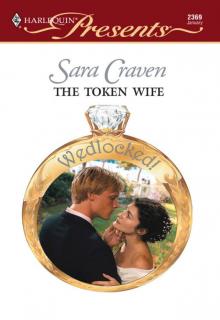 The Token Wife
The Token Wife Mistress on Loan
Mistress on Loan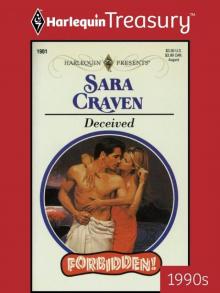 Deceived (Harlequin Presents)
Deceived (Harlequin Presents)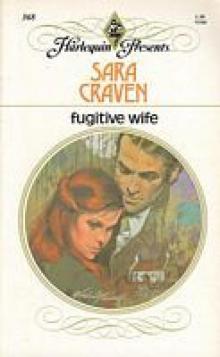 Fugitive Wife
Fugitive Wife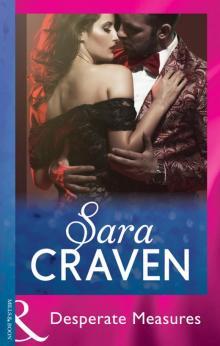 Desperate Measures
Desperate Measures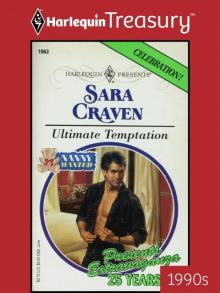 Ultimate Temptation (Harlequin Presents)
Ultimate Temptation (Harlequin Presents) The Highest Stakes of All
The Highest Stakes of All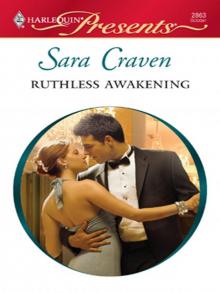 Ruthless Awakening
Ruthless Awakening Rome's Revenge
Rome's Revenge Forced Bride
Forced Bride Summer of the Raven
Summer of the Raven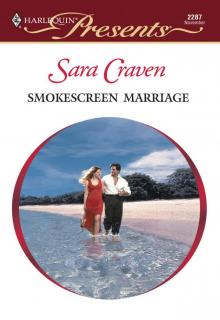 Smokescreen Marriage
Smokescreen Marriage The Innocent's Shameful Secret
The Innocent's Shameful Secret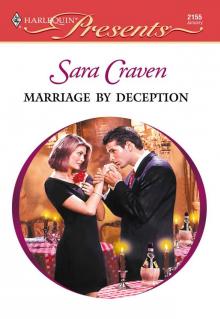 Marriage by Deception
Marriage by Deception The Virgin s Wedding Night
The Virgin s Wedding Night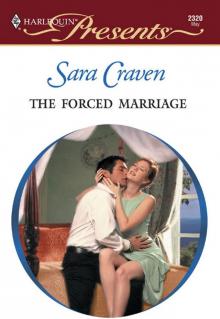 The Forced Marriage (Italian Husbands)
The Forced Marriage (Italian Husbands) The Innocent's Sinful Craving
The Innocent's Sinful Craving Inherited by Her Enemy
Inherited by Her Enemy Wife in the Shadows
Wife in the Shadows The Innocent's Surrender
The Innocent's Surrender Storm Force
Storm Force The Seduction Game (Harlequin Presents)
The Seduction Game (Harlequin Presents) The Santangeli Marriage
The Santangeli Marriage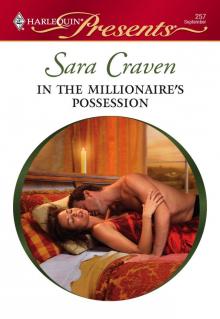 In the Millionaire's Possession
In the Millionaire's Possession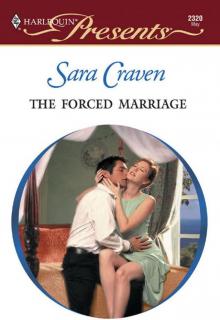 The Forced Marriage
The Forced Marriage Alien Vengeance
Alien Vengeance A Nanny for Christmas
A Nanny for Christmas His Reluctant Bride
His Reluctant Bride Heart of a Hero
Heart of a Hero The Price of Retribution
The Price of Retribution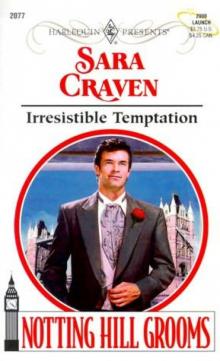 Irresistible Temptation
Irresistible Temptation Dark Apollo
Dark Apollo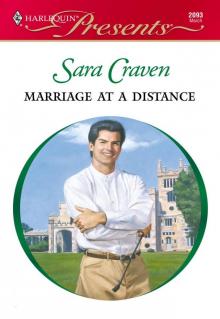 Marriage at a Distance (Presents, 2093)
Marriage at a Distance (Presents, 2093) Count Valieri's Prisoner
Count Valieri's Prisoner The Innocent's One-Night Confession
The Innocent's One-Night Confession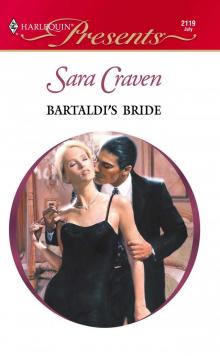 Bartaldi's Bride
Bartaldi's Bride His Untamed Innocent
His Untamed Innocent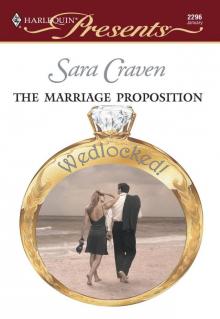 The Marriage Proposition
The Marriage Proposition The Right Bride?
The Right Bride? The End of her Innocence
The End of her Innocence